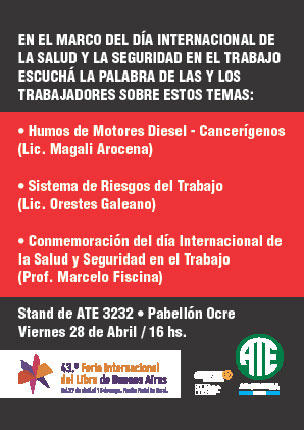|
||||
|
||||
|
||||
|
||||
|
||||
|
||||
 UN SALUDO CORDIAL PROF. MARCELO FISCINA SECRETARIO DE SALUD LABORAL C.T.A. Capital
UN SALUDO CORDIAL PROF. MARCELO FISCINA SECRETARIO DE SALUD LABORAL C.T.A. Capital
LOS ESPERO EN LA FERIA DEL LIBRO.
Hoy, abril 28, Día de la Seguridad en el Trabajo, vale la pena advertir que no hay nada más inseguro que el trabajo. Cada vez son más y más los trabajadores que despiertan, cada día, preguntando:
–¿Cuántos sobraremos? ¿Quién me comprará?
Muchos pierden el trabajo y muchos pierden, trabajando, la vida: cada quince segundos muere un obrero, asesinado por eso que llaman accidentes de trabajo.
La inseguridad pública es el tema preferido de los políticos que desatan la histeria colectiva para ganar elecciones. Peligro, peligro, proclaman: en cada esquina acecha un ladrón, un violador, un asesino. Pero esos políticos jamás denuncian que trabajar es peligroso, y es peligroso cruzar la calle, porque cada veinticinco segundos muere un peatón, asesinado por eso que llaman accidente de tránsito; y es peligroso comer, porque quien está a salvo del hambre puede sucumbir envenenado por la comida química; y es peligroso respirar, porque en las ciudades el aire puro es, como el silencio, un artículo de lujo; y también es peligroso nacer, porque cada tres segundos muere un niño que no ha llegado vivo a los cinco años de edad.
LOS HIJOS DE LOS DÍAS, EDUARDO GALEANO (EDITORIAL SIGLO XXI, 2012).
Commenting on Workers’ Memorial Day, which takes place tomorrow 28 April, ITF president Paddy Crumlin said: “This is the day we remember all those, known and unknown, friends and strangers, who have suffered injury or death in the workplace. It’s the day we remember the dead and fight for the living.
“But remembering is not enough. Workplace deaths are preventable deaths. We have a duty as trade unionists and as human beings to fight back against what amounts to a continuing slaughter. We must enshrine health and safety at work and ensure that employers treasure it too. We have to live and breathe it, and make sure everyone else does too. It must be supported, paid for and promoted until every workplace is a safe place.”
ITF general secretary Steve Cotton added: “Worldwide, transport workers labour in some of the most dangerous environments there are: on sea, on land and in the air. Often isolated, sometime facing violence and the threat of violence. Our unions are working together to minimise those risks, share knowledge and strategies, and build safe workplaces. On Workers’ Memorial Day we take a moment to remember the lost, before returning to the struggle to build a better future. “
For more information about Workers’ Memorial Day see www.28april.org
ENDS
ITF communications: getting the message out – when and where it matters
Twitter: @itfglobalunion
Již tradičně si 28. dubna připomínají odbory na celém světě památku obětí pracovních úrazů, nemocí z povolání a zraněných při práci. Hlavním smyslem je poukazovat na nutnost zdravého pracovní prostředí a zdůrazňovat velmi významný a stále podceňovaný význam prevence v oblasti bezpečnosti práce.
Za účasti generálního inspektora SÚIP Rudolfa Hahna, předsedy ČMKOS Josefa Středuly a místopředsedkyně ČMKOS Radky Sokolové se 28. dubna 2017 ve 12 hod. před sídlem ČMKOS (nám. W. Churchilla 2, Praha 3) uskuteční pietní akt za 104 zbytečně vyhaslých lidských životů.
Přílohy:
2017-04-25-mezinarodni-vzpominkovy-den_1.doc 79 kB
https://www.cmkos.cz/obsah/219/cmkos-symbolicky-polozi-104-krizu-za-obeti-smrtelnych-pracov/19025
CCESSA is organising a 28 April public conference to update unions and safety experts on the updated OHS regulations in Nigeria.
Update from BWI
FTBBF, FNTCS, SNTBB will mark 28 April in Ougadougou by raising awareness of the safety and health hazards faced by casual and temporary workers.
International Workers’ Memorial Day (IWMD) will be marked at events across the country on Friday 28 April 2017. Listings can be found on the STUC’s website.
Should you wish to know more about the background to IWMD and to get ideas for organising, read this flier prepared by Greater Manchester Hazards Centre and watch their new film.
If you’re preparing speeches/materials for IWMD, make sure you tell “The Whole Story” on work-related injury, deaths and illness, by using the details contained in this presentation, again prepared by GMCH.
Details of how to obtain resources such as purple forget-me-knot ribbons, “Union Workplaces are Safer Workplaces” car stickers, posters, stickers, etc is available in this leaflet.
Can we ask that you send photos of your events to Ian Tasker @ the STUC – itasker@stuc.org.uk and to us at Scottish Hazards using info@scottishhazards.org .
“Unions Make Work Safer!” is the slogan for International Workers’ Memorial Day on 28 April 2017. “Forestry work does not compare to factory or construction work and it presents its own sets of challenges and problems in terms of Occupational Health and Safety (OSH). However, BWI affiliates in the sector work hard every day to minimize the risks of forestry work and make sure that OSH trainings and provisions are put in place.” says BWI General Secretary Ambet Yuson.